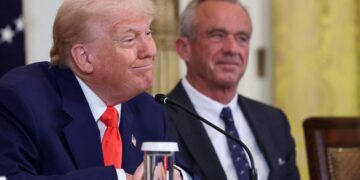U.S. markets are poised for new highs as President Donald Trump’s legislative agenda of tax cuts and spending priorities cleared a key hurdle in the Senate, even as he also cast doubt on trade talks.
Futures for the Dow Jones Industrial Average rose 180 points, or 0.42%. S&P 500 futures were up 0.18%, and Nasdaq futures also added 0.23%, after both indexes notched new record highs on Friday.
U.S. oil prices dipped 0.84% to $64.97 per barrel, and Brent crude was down 0.65% at $67.33.
The yield on the 10-year Treasury edged down 0.8 basis point to at 4.275%. The dollar fell 0.07% against the euro and 0.1% against the yen. Gold eased 1% to $3,256.70 per ounce.
Trump’s top legislative priority—his package of tax cuts and spending priorities—narrowly cleared a key procedural hurdle in the Senate over the weekend.
A final vote is still pending, as senators look to debate the bill and offer amendments. The House of Representatives also must approve the Senate’s version of the bill before it can go the White House for Trump’s signature.
The president has demanded that lawmakers finish the bill before the July 4 holiday. The tax cuts are a key factor in Wall Street’s forecasts for the economy and financial markets, predicting a boost that will help offset a drag from Trump’s tariffs.
Meanwhile, another deadline is fast approaching.
In April, Trump put his reciprocal tariffs on hold for 90 days while his administration engaged in trade negotiations. Stocks have rebounded since then as investors assumed the worst of the trade war was over.
The pause will expire on July 9, and Treasury Secretary Scott Bessent suggested as recently as Friday that the deadline is flexible. He told Fox Business that about a dozen deals with top trade partners could be wrapped up by Labor Day.
But in an interview that aired on Sunday, Trump said he could instead send letters that simply inform countries of tariff rates they will face.
When asked if the pause will not be extended, he said, “I don’t think I’ll need to because—I could—there’s no big deal.” Trump further clarified his stance on the July 9 deadline, saying “I’m gonna send letters. That’s the end of the trade deal.”
His dismissive attitude toward a deadline extension also comes as Trump said Friday he is ending all trade talks with Canada immediately, citing its plan to levy digital services taxes on U.S. tech giants.
The coming holiday-shortened week also features several high-profile economic datasets that could offer more clues on how tariffs are, or are not, affecting activity.
On Tuesday, the Institute for Supply Management will release its manufacturing index, and the Labor Department issues its job openings report.
On Wednesday, ADP will put out its private-sector payroll report. And on Thursday, the Labor Department will publish weekly unemployment claims and its monthly jobs report. Markets will be closed for the July 4 holiday.
Federal Reserve Chairman Jerome Powell is also scheduled to speak Tuesday at a European Central Bank forum in Sintra, Portugal. That follows two days of testimony on Capitol Hill last week and a post-FOMC press briefing the week before.

















